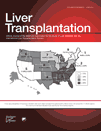
LIVER TRANSPLANTATION
Scope & Guideline
Connecting Experts to Enhance Liver Transplant Outcomes.
Introduction
Aims and Scopes
- Liver Transplantation Techniques and Innovations:
Research on surgical techniques, including minimally invasive approaches, robotic surgery, and machine perfusion methods, aimed at improving donor and recipient outcomes. - Patient Selection and Outcomes:
Studies focusing on criteria for patient selection for liver transplantation, including the assessment of comorbidities, socioeconomic factors, and psychosocial evaluations. - Immunosuppression and Management of Complications:
Investigations into immunosuppressive therapies, management of rejection episodes, and long-term complications associated with liver transplantation. - Health Disparities and Access to Transplantation:
Analysis of disparities in access to liver transplantation based on race, socioeconomic status, and geographic location, aiming to address inequities in the healthcare system. - Emerging Therapies and Future Directions:
Exploration of novel therapeutic approaches, including the use of targeted therapies, gene therapies, and advancements in pre- and post-transplant care. - Pediatric Liver Transplantation:
Focus on specific challenges and outcomes related to pediatric liver transplantation, including donor-recipient matching and long-term follow-up.
Trending and Emerging
- Telemedicine and Remote Monitoring:
The increasing focus on telemedicine highlights its role in enhancing patient care, particularly in managing liver transplant candidates and recipients, indicating a shift towards more accessible healthcare. - Psychosocial Aspects of Transplantation:
There is a growing recognition of the importance of psychosocial evaluations and support for transplant candidates, reflecting a holistic approach to patient care. - Health Equity and Social Determinants of Health:
Emerging research emphasizes the impact of social determinants on access to liver transplantation, aiming to address disparities and improve equity in healthcare. - Long-Term Outcomes and Survivorship:
A trend towards studying long-term outcomes post-transplantation, including quality of life and functional recovery, indicates a shift in focus from merely survival rates to overall patient well-being. - Innovative Preservation Techniques:
Advancements in liver preservation methods, such as machine perfusion and novel preservation solutions, are gaining attention, indicating a trend towards improving graft viability and outcomes.
Declining or Waning
- Traditional Surgical Techniques:
There is a noticeable decline in publications emphasizing traditional open surgical techniques, as the field increasingly favors minimally invasive and robotic approaches. - Single-Center Studies:
A reduction in the number of single-center studies suggests a shift toward multicenter collaborations that provide broader datasets and findings applicable to diverse populations. - Basic Science Research:
While foundational research remains important, there seems to be a waning interest in purely basic science studies, with a preference for translational research that directly impacts clinical practice. - Focus on Ischemia-Reperfusion Injury:
Research on ischemia-reperfusion injury has become less frequent, possibly due to advancements in preservation techniques and improved understanding of the underlying mechanisms. - Conventional Biomarker Studies:
The emphasis on traditional biomarkers for liver function and rejection monitoring is decreasing, as newer technologies and methodologies are being explored.
Similar Journals
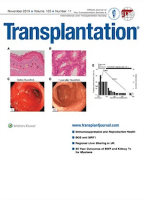
TRANSPLANTATION
Uncovering Insights for a Brighter Transplant Future.TRANSPLANTATION is a premier journal in the field of organ transplantation, published by Lippincott Williams & Wilkins, that has been a cornerstone of transplantation research since its inception in 1963. With an impressive impact factor cementing its status, this journal is categorized in the top quartile (Q1) of its field, currently ranking 6th out of 54 in the Scopus Medicine Transplantation category, placing it in the 89th percentile. The journal publishes original research, clinical studies, and reviews that significantly advance our understanding of transplantation science, ensuring that professionals, researchers, and students remain informed of the latest developments. Although it is not an open-access journal, it offers valuable insights that contribute to enhancing practice and improving outcomes in transplantation medicine, making it an essential resource for anyone involved in this dynamic and impactful discipline.
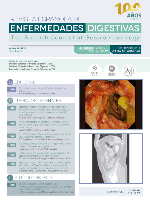
REVISTA ESPANOLA DE ENFERMEDADES DIGESTIVAS
Connecting researchers and clinicians for better outcomes.REVISTA ESPANOLA DE ENFERMEDADES DIGESTIVAS, a pivotal Open Access journal published by ARAN EDICIONES, S A, has been at the forefront of advancing the field of gastroenterology since its inception in 1990. With a robust commitment to disseminating high-quality research, the journal provides a platform for researchers, clinicians, and students to share innovative findings and insights concerning digestive diseases. The journal is characterized by its Q3 ranking in both Gastroenterology and Miscellaneous Medicine categories, indicative of its significant contributions to these fields, and is positioned within the 36th percentile of Scopus rankings for medicine related to gastroenterology. Based in Spain, REVISTA ESPANOLA DE ENFERMEDADES DIGESTIVAS has embraced the Open Access model since 2004, ensuring that its articles are readily available to a global audience without financial barriers. The journal not only supports academic discourse but also plays a crucial role in improving clinical practices and health outcomes related to digestive health.
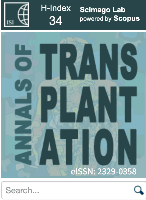
Annals of Transplantation
Transforming Lives with Cutting-Edge Transplant ResearchAnnals of Transplantation is a renowned academic journal published by INT SCIENTIFIC INFORMATION, INC, dedicated to the field of transplantation medicine. With a strong historical presence since its inception in 1996, this journal continues to provide a vital platform for disseminating innovative research, clinical studies, and review articles that contribute significantly to the ever-evolving landscape of organ transplantation. Holding a respectable Q2 ranking in the field of transplantation and a Q3 ranking in broader medicine categories as of 2023, the journal stands out with an impactful repository of knowledge that caters to a diverse audience, including researchers, healthcare professionals, and students. While it currently does not operate under an open access model, the scholarly contributions within are crucial for advancing practices, policies, and outcomes in transplantation. Whether you are seeking to keep abreast of recent advances or looking to publish your own findings, Annals of Transplantation serves as an essential resource for fostering collaboration and innovation in medical science.
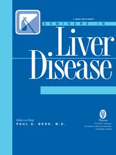
SEMINARS IN LIVER DISEASE
Advancing hepatology through rigorous research.SEMINARS IN LIVER DISEASE is a premier journal dedicated to advancing the field of hepatology, published by THIEME MEDICAL PUBL INC. Established in 1981, it has become a respected resource within the academic community, providing high-quality peer-reviewed articles that cover a broad range of topics related to liver diseases. With an impressive impact factor and recognized as a Q1 journal in the hepatology category, it ranks 17th out of 82 journals in the field, placing it in the top 21% of its category according to Scopus rankings. Although it does not offer open access, the journal’s rigorous standards and extensive network ensure that it reaches a wide audience of clinicians, researchers, and students, fostering knowledge and innovation in liver disease management. The journal's objectives focus on disseminating critical insights and promoting informed discussions that can pave the way for future research and clinical advancements in hepatology.

Transplantation Reviews
Delivering high-impact research for a brighter surgical future.Transplantation Reviews is a premier scholarly journal published by Elsevier Science Inc, dedicated to advancing the field of transplantation and surgery. With an impressive impact factor and categorized in the top quartile (Q1) for both Surgery and Transplantation as of 2023, this journal prominently ranks in the 96th and 86th percentiles for its respective disciplines. Since its inception in 1987, it has provided a vital platform for researchers and professionals to disseminate high-quality, peer-reviewed articles that reflect the latest advancements and challenges in transplantation science. Although the journal is not currently open access, it remains a key resource for academic libraries and institutions. By fostering discussions and providing insights into clinical practices, Transplantation Reviews serves to enhance understanding and improve outcomes in the ever-evolving field of transplantation, making it an essential read for anyone engaged in this dynamic area of medicine.
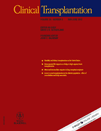
CLINICAL TRANSPLANTATION
Empowering the Global Transplantation CommunityClinical Transplantation is a leading journal in the field of transplantation medicine, published by Wiley. With an ISSN of 0902-0063 and an E-ISSN of 1399-0012, this prestigious journal has been pivotal in advancing the understanding of clinical practices and innovative research in transplantation since its inception in 1989. Based in the United Kingdom, it is recognized within the Category Quartiles as Q2 in Transplantation and boasts a respectable Scopus rank, placing it #20 out of 54 in its field, highlighting its significance. The journal serves as a platform for disseminating peer-reviewed articles that encompass a wide range of topics, from organ transplantation techniques to post-operative care and immunology, catering to researchers, healthcare professionals, and students alike. As the field progresses towards more personalized and effective treatment approaches, Clinical Transplantation remains committed to providing insight and fostering excellence in research for the global transplantation community.

ABCD-Arquivos Brasileiros de Cirurgia Digestiva-Brazilian Archives of Digestive Surgery
Transforming Digestive Surgery with Open Access KnowledgeABCD-Arquivos Brasileiros de Cirurgia Digestiva-Brazilian Archives of Digestive Surgery is a reputable open access journal published by the Colégio Brasileiro de Cirurgia Digestiva (CBCD), dedicated to advancing the field of digestive surgery. With a focus on the latest research and clinical practices, the journal has been instrumental since its inception in fostering knowledge sharing within the surgical community. Its impressive impact factor and inclusion in renowned databases underscore its significance, particularly in gastroenterology and surgery, as evidenced by its 2023 quartile rankings of Q3 in Gastroenterology and Medicine, and Q2 in Surgery. Accessible since 2017, ABCD not only bridges the gap between research and practice in Brazil but also globally as researchers, professionals, and students contribute and gain insights into innovative surgical techniques and outcomes. Based in São Paulo, Brazil, the journal covers a broad spectrum of topics in digestive health and serves as a crucial resource for anyone passionate about surgery and medicine.
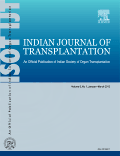
Indian Journal of Transplantation
Championing Open Access for Transplantation InsightsIndian Journal of Transplantation (ISSN: 2212-0017, E-ISSN: 2212-0025), published by Wolters Kluwer Medknow Publications, serves as a pivotal resource in the expanding field of transplantation medicine. As an Open Access journal since 2011, it provides unrestricted access to cutting-edge research, facilitating the dissemination of knowledge among practitioners, researchers, and students globally. With a growing focus on transplant-related advancements from 2020 to 2024, the journal has positioned itself within the Q4 category in Transplantation, underscoring its commitment to publishing valuable contributions that aim to enhance clinical practices and improve patient outcomes. Situated in the Netherlands, the journal upholds high-quality standards, inviting submissions that contribute to the understanding of various transplant procedures and practices, ultimately fostering innovation in the field. Researchers and professionals are encouraged to explore the vast array of articles, enhancing both their expertise and the community's collective knowledge in transplantation.

Hepatology Forum
Fostering collaboration in the fight against liver disorders.Hepatology Forum is an esteemed journal dedicated to disseminating cutting-edge research and insights in the fields of gastroenterology and hepatology. Published by KARE PUBL in Turkey, this journal serves as a vital platform for researchers, clinicians, and healthcare professionals aiming to advance their knowledge and practices related to liver diseases and gastrointestinal disorders. With an ISSN of 1307-5888 and an E-ISSN of 2757-7392, it features peer-reviewed articles that encompass a wide range of topics from basic research to clinical applications. Although categorized in the Q3 quartile for both gastroenterology and hepatology in 2023, Hepatology Forum continues to show significant potential for growth and impact, as evidenced by its Scopus rankings. Through its commitment to open scientific exchange, the journal not only facilitates the sharing of innovative methodologies and findings but also fosters networking among professionals in the field. As it converges through the years from 2020 to 2024, Hepatology Forum remains an important resource for the advancement of liver health and diseases, appealing to both established experts and emerging scholars alike.

JHEP Reports
Driving excellence in gastroenterology and internal medicine.JHEP Reports, published by ELSEVIER, stands at the forefront of scholarly communication in the fields of Gastroenterology, Hepatology, Immunology and Allergy, and Internal Medicine. As an Open Access journal since 2019, it provides a platform for the dissemination of high-quality research findings, making vital information readily accessible to a global audience. With a commendable impact characterized by a Q1 category ranking across four medical disciplines in 2023, JHEP Reports demonstrates its significance and influence, reflected in its impressive Scopus ranks—#11 in Gastroenterology and #14 in Internal Medicine, amongst others. This esteemed journal not only plays a critical role in advancing knowledge but also fosters collaboration among researchers, practitioners, and students keen on exploring innovations and breakthroughs in health sciences. At RADARWEG 29, 1043 NX AMSTERDAM, NETHERLANDS, JHEP Reports is committed to bridging the gap between research and application, ushering in a new era of informed and effective healthcare solutions.